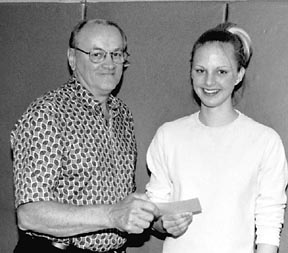 Katie Nelson won the third annual Human Rights Essay Contest with her essay entitled "Childhood."
Katie Nelson won the third annual Human Rights Essay Contest with her essay entitled "Childhood."All eighth grade students at Paynesville Area Middle School wrote essays and the top 10 were submitted to the Paynesville Human Rights Commission for final judging.
Joe Voss presents Katie Nelson with a gift certificate for winning the Human Rights essay contest.
They could select a topic from the Universal Declaration of Human Rights relating to an article or event that has happened in local, national, or international news. Among the topic students wrote on were: discrimination, abortion, gay rights, sexual predators, and sexual harassment.
Nelson is the daughter of Dave and Diane Nelson.
Second place went to Kim Hess, daughter of Dave and Barb Hess, and third place went to Laura Buermann, daughter of Alan and Lynn Buermann.
Because the top five essays were so close, the judges awarded honorable mention to Michael Mueller, son of Butch and Bev Mueller; and Carrie Nietfeld, daughter of Brian and Judy Nietfeld.
The winning essay has been entered in a statewide contest. Last year's local winner, Adam Ingalsbe, placed third at the state level.
Childhood by Katie Nelson
Childhood, playing all day in the sandbox, or swinging as high as you can in the sky, we take it all for granted. We don't know how lucky we actually are to have been born and raised in the United States.
Across the world from Columbia and Chechnya to Somalia and Sri Lanka, children are captives of war. A 14-year-old boy from Sierra Leone sees the horror of people being burned alive. In Uganda a 12-year-old girl is sold for sexual slavery. A 14-year-old boy holds in his hands an AK-47. And a 10-year-old girl is ordered to shoot her best friend.
Before these children learn to read or write, or before they can vote, they have to sacrifice their lives for a cause. Whatever that cause may be.
It has been estimated that in 30 countries around the world, about 300,000 children are used as soldiers. Two years ago, in 1998, the United Nations met with Sri Lanka to stop the use of children in war. Sri Lanka agreed and said they would start using only adults over 18 years of age. But after recent battles, they have found bodies of Sri Lanka's soldiers who are between the ages of 12 and 16.
For some of us it is hard to imagine going away for a week, or more, and not seeing our parents. Well, these children are away from their parents for days, weeks, months, even years, or until they have survived fighting in the front lines. Once they have accomplished that, they are able to return home.
Children soldiers have been around since the Middle Ages, but there are more now than ever in history. The roles of the children have also changed. The soldiers are usually young boys and girls. But most often the girls are sold as sexual slaves to the officers. Most of these children come from poor families, or have been separated from their families. Some of them even thought that becoming a soldier would somehow improve their life.
In the United States there is something that protects our children from serving as children soldiers, it is the Declaration of Human Rights. The Declaration lists the rights we have as human beings living in the United States. As you can tell many countries around the world don't have such a declaration. This action of having children soldiers goes against five articles: article number four, which states "no slavery;" article 15, "We can choose which country we want to be loyal to;" article 20, "We can choose what groups we want to be with;" article 23, "you can choose your own career;" and article 26, "We have the right to have an education."
I learned most of this information from an Up-Front magazine. The articles talked a lot about what the kids go through each day, how they feel and act in those kinds of situations, and how some of them only went to the military camps to be fed, and then they were trapped, and could never escape.
It is hard to imagine how being in this situation would affect our lives. But I know for sure that it wouldn't affect us in a very positive way. We sometimes think our lives are hard here in the United States, but these children go through more than we'll ever know.